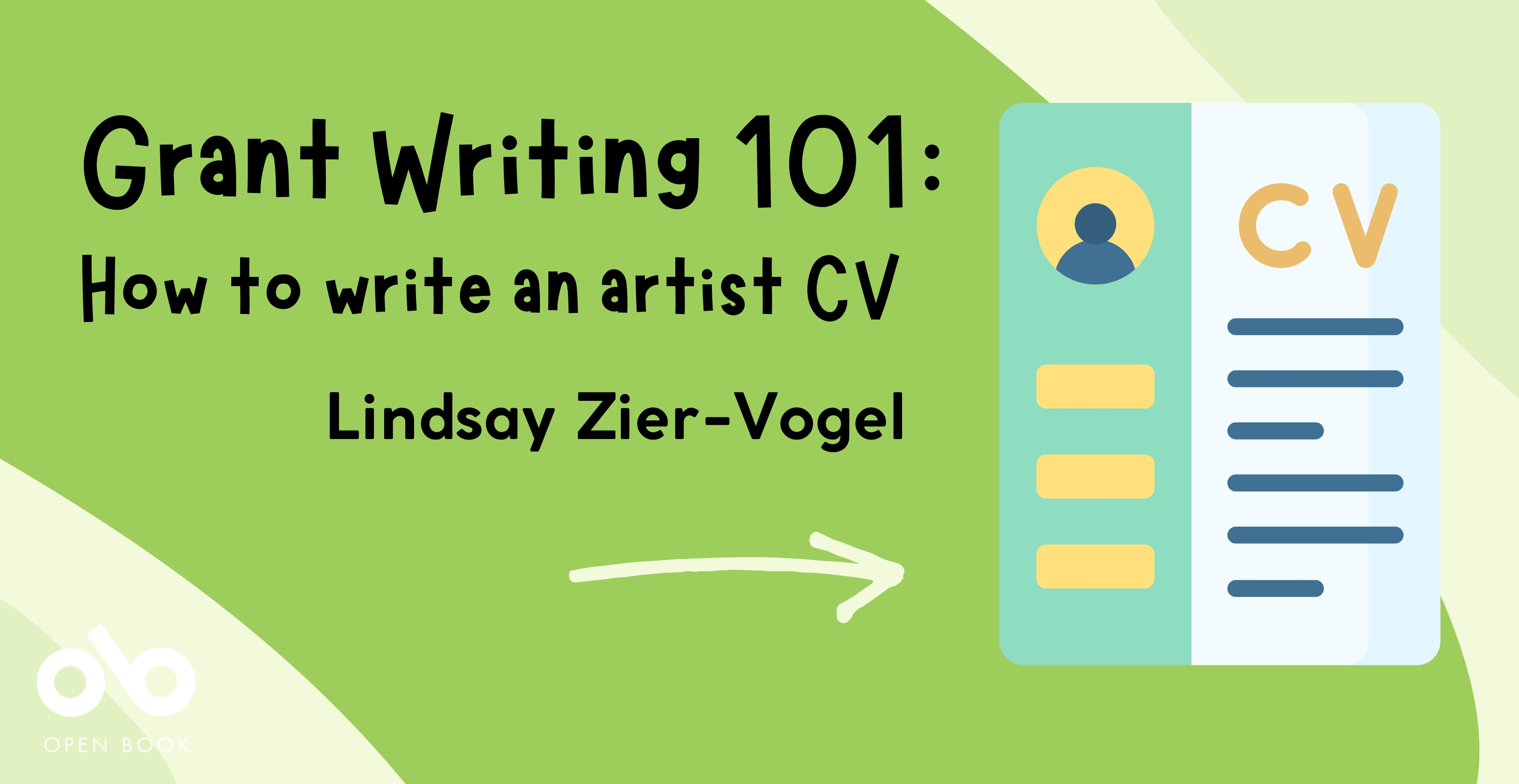Grant Writing 101: How to write an artist CV
By Lindsay Zier-Vogel
I know the pools are still open, and we’re still subsisting on popsicles and ice cream truck soft serve, but grant season is coming, and no matter what grant you’re applying for, you’ll need an artist CV.
When I’m not working on my own writing, I write grants for artists, and the first thing we do is get their artist CV in tip-top shape.
It’s important to note that generally, the purpose of an artist CV is to determine eligibility for a grant. Does the grant say you have to have X number of publications to be eligible to apply? This is where you put it all down.
What is the difference between an artist CV and “work” CV?
An artist CV is NOT a job-job CV. The order of information is different, and most importantly, the focus is different. The purpose of an artist CV is to show your artistic work only. No need to include your work as a barista, or swim instructor.
And, it does not have to look fancy or be designed. Simple works!
Note: It generally has to be three pages or less.
Essential: Intro
Your CanLit News
Subscribe to Open Book’s newsletter to get local book events, literary content, writing tips, and more in your inbox
After your full name and contact info, you can include a paragraph about your work as an artist, or not! Your choice.
Essential: Publications
This section is essential as it is going to show the grant officer/jury that you’re eligible for funding. I like to list my publication credits by genre—books, anthologies, fiction, non-fiction, poetry, etc.
Every granting body asks for a little something different when it comes to publication credits—some want the date, some want the location, some want the number of pages—so I like to have one CV that covers all the bases, so I include:
- the year of publication
- the name of the publisher
- the city the publisher is based in
- the number of published pages (or indicate “online”)
- I often include confirmed forthcoming publications, because why not!
What if you have no publishing credits?
If you’re just starting out and you don’t have any publishing credits, the Canada Council has a great program for early career artists (and there’s no age cap, because we all know that emerging has nothing to do with age!) And in this case, you don’t have to include publishing credits. Huzzah!
Not essential: Readings, festivals, residencies
After the list of publications, I include anything else that is writing related: readings, festivals and/or residencies. Remember, these are not essential and you can always add them as you build your career.
Not essential: Relevant education
This section is for education that is relevant to your work as an artist and it does NOT have to be from a university or post-secondary education. Include workshops you’ve attended, or mentorships you’ve had—anything that’s helped you explore your craft.
If you have a degree in Biology, or an MBA, or a certificate in plumbing, you do not have to include it in an artistic CV (unless, of course, it’s relevant to your artistic practice, in which case, of course include it!!)
Not essential: Awards/teaching gigs/juries, etc
Again, this section is not essential, but you can include anything else that might be relevant to your artistic career here including awards, grants, teaching gigs, juries you’ve sat on, etc.
Ordering your artistic CV
This is the order I suggest writers use for their artistic CVs:
Necessary components:
- Name, contact info
- Publications by genre (including date, publisher, number of pages (or indicate “online”)
Potential components (that are NOT necessary!):
- Reading
- Festivals
- Residencies
- Relevant education (including workshops, mentorships)
- Awards
- Anything else! Teaching gigs, juries, etc
Note: If you’re looking for more support with grant writing, I’ve written a lot more about grant writing here at Open Book:
You didn’t get a grant…now what?
The views expressed by Open Book columnists are those held by the authors and do not necessarily reflect the views of Open Book.
Lindsay Zier-Vogel is an author, arts educator, grant writer, and the creator of the internationally acclaimed Love Lettering Project. After studying contemporary dance, she received her MA in Creative Writing from the University of Toronto. She is the author of the acclaimed debut novel Letters to Amelia and her work has been published widely in Canada and the UK. Dear Street is Lindsay’s first picture book, and is a 2023 Junior Library Guild pick, a 2023 Canadian Children’s Book Centre book of the year, and has been nominated for a Forest of Reading Blue Spruce Award. Since 2001, she has been teaching creative writing workshops in schools and communities, and as the creator of the Love Lettering Project, Lindsay has asked people all over the world to write love letters to their communities and hide them for strangers to find, spreading place-based love.



